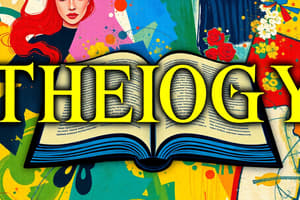Podcast
Questions and Answers
What is the primary goal of theology?
What is the primary goal of theology?
- The study of religious practices
- Faith seeking understanding (correct)
- Proving the existence of God
- Understanding religious texts
What are the two sources of revelation?
What are the two sources of revelation?
- Tradition and Sacraments
- Nature and Scripture
- Scripture and Tradition (correct)
- Philosophy and History
What is the primary relationship that defines Christianity?
What is the primary relationship that defines Christianity?
- A commitment to church community
- A relationship with Jesus Christ (correct)
- Adherence to religious rituals
- A set of moral guidelines
Which senses of Scripture involves moral teachings?
Which senses of Scripture involves moral teachings?
What did Nietzsche claim about Christianity and Eros?
What did Nietzsche claim about Christianity and Eros?
What concept differentiates theology from religion?
What concept differentiates theology from religion?
Who is responsible for ensuring the faithful transmission of revelation?
Who is responsible for ensuring the faithful transmission of revelation?
Which sense of Scripture highlights the relationship between the Old and New Testament?
Which sense of Scripture highlights the relationship between the Old and New Testament?
What does the term 'ekklesia' signify in Christianity?
What does the term 'ekklesia' signify in Christianity?
How does Benedict XVI view the relationship between Eros and Agape?
How does Benedict XVI view the relationship between Eros and Agape?
What does humanity's unique relationship to God confer upon them?
What does humanity's unique relationship to God confer upon them?
What state exists between humanity and creation in the concept of Original Justice?
What state exists between humanity and creation in the concept of Original Justice?
What is one of the capacities that distinguishes man from other creatures according to theological truths?
What is one of the capacities that distinguishes man from other creatures according to theological truths?
What is the nature of sin as described in the context of relationships?
What is the nature of sin as described in the context of relationships?
What is the implication of deceit in relation to humanity's view of God?
What is the implication of deceit in relation to humanity's view of God?
How does sin affect humanity's relationship with creation?
How does sin affect humanity's relationship with creation?
What does the story of Cain and Abel illustrate about sin?
What does the story of Cain and Abel illustrate about sin?
What is one of the features of a covenant as described?
What is one of the features of a covenant as described?
What was the blessing given in God's covenant with Noah?
What was the blessing given in God's covenant with Noah?
In humanity's attempt to assist God, what does Abram suggest?
In humanity's attempt to assist God, what does Abram suggest?
Humanity's changing stance towards God is characterized by which reaction?
Humanity's changing stance towards God is characterized by which reaction?
Flashcards are hidden until you start studying
Study Notes
Theology
The goal of theology is to understand faith.
- Theology differs from religion and religious studies by being a critical and analytical study of faith.
Revelation
- Revelation is God making himself known to humanity.
- The two sources of revelation are sacred scripture and tradition.
- The church is responsible for ensuring faithful transmission of revelation.
Sacred Scripture
- God is the ultimate author of sacred scripture.
- Human authors are inspired by God and their individual personalities and writing styles are present.
- The literal sense of scripture refers to the plain meaning of the text.
- The spiritual sense is interpreted through allegory, moral, and anagogical lenses.
- The allegorical sense sees the text as a symbol for something else.
- The moral or tropological sense focuses on the practical lessons that can be learned.
- The anagogical sense interprets the text in light of its eternal significance.
- The Old Testament foreshadows the New Testament.
- The Gospels describe the earthly life of Jesus.
Christianity as an Encounter with a Person
- Christianity is a relationship with God, not just a set of beliefs.
- Being a Christian is a calling, not a choice.
- The word "ekklesia" means "called from" in Greek.
- Christians are called into a relationship with God based on love.
- God must be knowable for a relationship between humanity and God to exist.
Christianity and Eros
- Nietzsche argued that Christianity poisoned eros by turning sexuality into a taboo.
- Pope Benedict XVI argued that Christianity heals eros.
- Eros needs to be infused with agape, or love for God and humanity.
Theology
- The goal of theology is for faith to seek understanding
- Theology differs from religion/religious studies as it attempts to understand the faith and religious studies study the faith
Revelation
- Revelation is the way that God communicates to humanity
- The two sources of revelation include Sacred Scripture and Sacred Tradition
- The Church is responsible for ensuring revelation is transmitted truthfully and without error
Sacred Scripture
- God is the ultimate author of Sacred Scripture
- Human authors are inspired by God to write Scripture
- The senses of Scripture include:
- Literal: The plain meaning of the text
- Spiritual: The spiritual meaning of the text
- Allegorical: The text as a symbolic story
- Moral/Tropological: The text as a lesson for our lives
- Anagogical: The text as a sign of the future
- The Old Testament foreshadows the New Testament
- The Gospels describe the earthly life of Jesus
Christianity as an Encounter with a Person - Jesus Christ
- Christianity is primarily about a relationship with God
- Conversion cannot be forced
- Being a Christian is a calling
- The Church is called "ekklesia" which means "called out"
- The Christian God is knowable, because the premise of Christianity is the ability for God and Man to enter into a relationship
Christianity and Eros
- Nietzsche believed Christianity poisoned Eros by turning sexuality into a taboo
- Benedict XVI believed Christianity heals Eros
- Eros needs to be infused with Agape
- Agape without Eros can lead to stoicism or Gnosticism
- Eros in its most primitive form seeks pleasure, but when informed by Agape, it seeks the happiness of another
Creation
- Genesis 1 and Genesis 2 reveal theological truths about creation
- God created everything
- Humanity has a unique relationship with God, giving them a dignity not given to other creatures
- Humanity is the only creature that can know and love God
- Humanity has the capacity for self-knowledge and self-possession
- Humanity is given dominion over creation
- Humanity is instructed to flourish and multiply
- Men and women are created as equals and complements
- Humanity was in a state of Original Justice (harmony in intrapersonal relationships, and relationship between humanity and creation)
The Fall
- Sin was a result of deceit
- Humanity was tricked into believing that God was holding them back from reaching their potential
- Sin impacts free will
- Free will is the ability to choose the good
- Deceit prevents humanity from fully understanding the good
- Sin is a denial of God's goodness
- The implication of the deceit is that God is not good
- Sin affects relationships
- Intrapersonal relationships are marred (Man and woman were created as partners, but after sin they saw each other as rivals)
- Humanity's relationship to creation is affected (the soil hard to till)
- Scapegoating becomes a state of affairs in relationships
- Intrapersonal: “Eve gave it to me"
- Human-God: "You put her here"
- Human-creation: "The serpent tricked me"
- Humanity separates itself from God
- Humanity hides from God
- Humanity is ashamed
- Sin is a permanent condition
- Humanity never returns to the Garden or to their state of Original Justice
Sin Grows/Proliferates
- Cain and Abel illustrate the movement from pride and envy to murder
- Cain and Able were brothers, but not in harmony with each other
- Rivalry forms when one sacrifice is chosen over another
- Murder is a denial of what brothers are supposed to be
- "Am I my brother's keeper?" is a denial of brotherhood
Covenants
- God’s redemptive plan to establish proper relationships
- Covenants include:
- Blessing
- Condition
- Sign
- New relationship
- Humanity breaks covenants, but God remains faithful
- Each covenant offers a greater blessing and establishes a greater relationship
- Noah:
- Blessing: Earth will never again be destroyed by flood
- Condition: No one should shed the blood of another human
- Sign: Rainbow
- Relationship: Family
- Abram/Abraham:
- Blessing: Land and descendants
- Condition: Circumcision
- Sign: Circumcision
- Relationship: Tribal Nation
- Abram is promised descendants. He and his wife Sarai often try to "help" God fulfill his promise.
- Abram suggests that his servant Eliezer could be his heir.
Studying That Suits You
Use AI to generate personalized quizzes and flashcards to suit your learning preferences.




